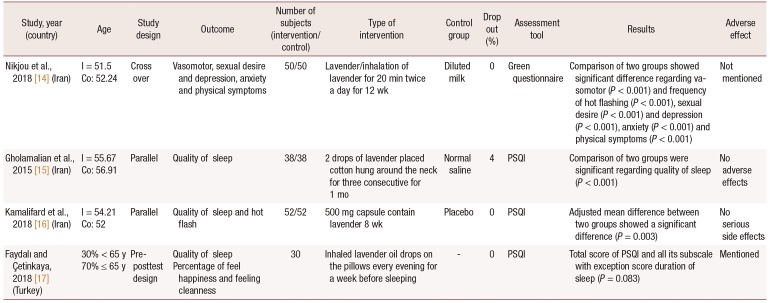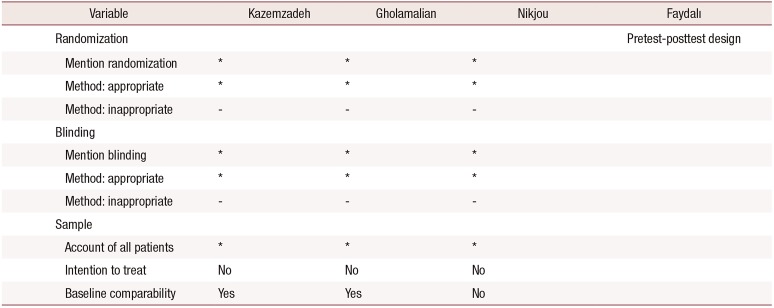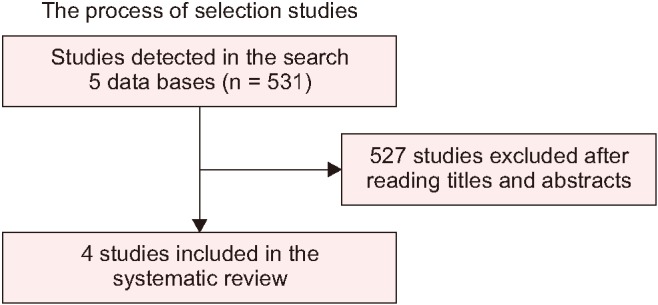1. Kamalifard M, Farshbaf Khalili A, Namadian M, Herizchi S, Ranjbar Y. Comparison of the effect of lavender and bitter orange on depression in menopausal women: a triple-blind randomized controlled trial. IJWHR. 2017; 5:224–230.

2. Kargozar R, Azizi H, Salari R. A review of effective herbal medicines in controlling menopausal symptoms. Electron Physician. 2017; 9:5826–5833. PMID:
29403626.

3. Avis NE, Stellato R, Crawford S, Bromberger J, Ganz P, Cain V, et al. Is there a menopausal syndrome? Menopausal status and symptoms across racial/ethnic groups. Soc Sci Med. 2001; 52:345–356. PMID:
11330770.

4. Kazemzadeh R, Nikjou R, Rostamnegad M, Norouzi H. Effect of lavender aromatherapy on menopause hot flushing: a crossover randomized clinical trial. J Chin Med Assoc. 2016; 79:489–492. PMID:
27388435.

5. Geller SE, Studee L. Contemporary alternatives to plant estrogens for menopause. Maturitas. 2006; 55 Suppl 1:S3–S13. PMID:
16884867.

6. Fattah A. Effect of phytoestrogen on depression and anxiety in menopausal women: a systematic review. J Menopausal Med. 2017; 23:160–165. PMID:
29354615.

7. Ghazanfarpour M, Amini E, Khadivzadeh T, Babakhanian M, Nouri B, Rakhshandeh H, et al. The effect of short-term treatment with fennel on bone density in postmenopausal women: a randomized controlled trial. J Menopausal Med. 2017; 23:124–130. PMID:
28951861.

8. Saghafi N, Ghazanfarpour M, Khadivzadeh T, Babakhanian M, Afiat M. The effect of Foeniculum vulgare (Fennel) on body composition in postmenopausal women with excess weight: a double-blind randomized placebo-controlled trial. J Menopausal Med. 2017; 23:166–171. PMID:
29354616.

9. Bakhtshirin F, Abedi S, YusefiZoj P, Razmjooee D. The effect of aromatherapy massage with lavender oil on severity of primary dysmenorrhea in Arsanjan students. Iran J Nurs Midwifery Res. 2015; 20:156–160. PMID:
25709705.
10. Peana AT, Moretti MDL. Linalool in essential plant oils: pharmacological effects. In : Preedy VR, Watson RR, editors. Botanical medicine in clinical practice. Walingford: CAB International;2008.
11. Fißler M, Quante A. A case series on the use of lavendula oil capsules in patients suffering from major depressive disorder and symptoms of psychomotor agitation, insomnia and anxiety. Complement Ther Med. 2014; 22:63–69. PMID:
24559818.

12. Bakhsha F, Mazandarani M, Aryaei M, Jafari SY, Bayate H. Phytochemical and anti-oxidant activity of lavandula angustifolia mill. Essential oil on preoperative anxiety in patients undergoing diagnostic curettage. Int J Women's Health Reprod Sci. 2014; 2:268–271.

13. Jadad AR, Moore RA, Carroll D, Jenkinson C, Reynolds DJ, Gavaghan DJ, et al. Assessing the quality of reports of randomized clinical trials: is blinding necessary? Control Clin Trials. 1996; 17:1–12. PMID:
8721797.

14. Nikjou R, Kazemzadeh R, Asadzadeh F, Fathi R, Mostafazadeh F. The effect of lavender aromatherapy on the symptoms of menopause. J Natl Med Assoc. 2018; 110:265–269. PMID:
29778129.

15. Gholamalian F, Tadayon M, Abedi P, Haghighizadeh MH. The effect of lavender aromatherapy on sleep quality in postmenopausal women. Iran J Obstet Gynecol Infertil. 2015; 18:18–25.
16. Kamalifard M, Farshbaf-Khalili A, Namadian M, Ranjbar Y, Herizchi S. Comparison of the effect of lavender and bitter orange on sleep quality in postmenopausal women: a triple-blind, randomized, controlled clinical trial. Women Health. 2018; 58:851–865. PMID:
28749734.

17. Faydalı S, Çetinkaya F. The effect of aromatherapy on sleep quality of elderly people residing in a nursing home. Holist Nurs Pract. 2018; 32:8–16. PMID:
29210873.

18. Malakouti J, Farshbaf Khalili A, Asghari Jafarabadi M, Jabbari F. Effect of combined inhaler aromatherapy on sexual function in postmenopausal women: a randomized controlled trial. Iran J Obstet Gynecol Infertil. 2016; 19:9–15.
19. Lotfipur-Rafsanjani SM, Vaziri-Nejad R, Ismailzadeh S, Ansari-Jaberi A, Bekhradi R, Ravari A, et al. Comparison of the efficacy of massage therapy and aromatherapy massage with geranium on depression in postmenopausal women: a clinical trial. Zahedan J Res Med Sci. 2015; 17:29–33.

20. Moussi Imane M, Houda F, Said Amal AH, Kaotar N, Mohammed T, Imane R, et al. Phytochemical composition and antibacterial activity of moroccan lavandula angustifolia mill. J Essent Oil Bear Plants. 2017; 20:1074–1082.

21. Ali B, Al-Wabel NA, Shams S, Ahamad A, Khan SA, Anwar F. Essential oils used in aromatherapy: a systemic review. Asian Pac J Trop Biomed. 2015; 5:601–611.







 PDF
PDF ePub
ePub Citation
Citation Print
Print




 XML Download
XML Download